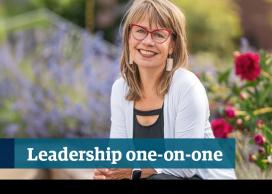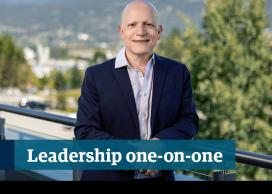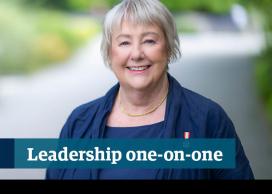Barbara Meens Thistle joined UBC in February 2018, as the Vice-President, Human Resources. A long-time champion of equity, diversity and inclusion, Barbara has a wealth of experience in strategic planning, change management and operational excellence.
Prior to joining UBC, Barbara was Vice-President, Central Services at the Insurance Corporation of BC (ICBC). She is a Certified Professional in Human Resources and a Fellow in the Canadian Board Diversity Council. In 2016, she was voted HR Professional of the Year by Chartered Professionals in Human Resources, BC and Yukon.
Q1. What quality do you most admire in a leader?
BMT: The ability to be vulnerable and the understanding that vulnerability is actually a strength. Good leaders should be able to reflect on the work they’ve done, and be able to recognize not only where they and their teams have been successful, but also when they may have made mistakes so that we can grow and move forward from lessons learned. It shows that a leader is human, like the rest of us. We can all face challenges and the struggles, whether in the workplace or in our personal lives. A strong leader connects with people on a human level. That is very powerful.
Q2. What makes you laugh?
BMT: My husband. He has a wicked sense of humour and wit. He also does an amazing Donald Duck impression! He makes me laugh every single day.
Q3. Who inspires you, and why?
BMT: I have to say my mother. From a very young age, she instilled in me a determination — that if you believe you need to move forward and that it’s the right thing to do, then you need to stay determined. Even in her later years, as her health has declined, she has remained determined to stand up for what she believes is the right thing to do. She is 88-years-old and continues to look out for the underdog, for those who may not have a voice or the courage to speak up. That is inspirational to me.
Q4. What drew you to UBC? What makes it different?
BMT: The thing that really drew me to UBC is the fact that it is making such a societal difference with its research and teaching. This university is conducting leading research that is helping address real issues in today’s society. This is also my first experience of working within the post-secondary sector, and it is a whole new dynamic of faculty, students and staff. I am excited to apply my experience in other sectors to UBC, to help build a culture at UBC that allows all those unique dynamics to combine and thrive, to further strengthen the university.
Q5. What is the most important lesson you’ve learned?
BMT: I have been in senior HR roles for many years, and am often brought into very complex issues. Something I have learned along the way is the importance of trusting your gut. The other thing I have learned is to ask questions…and to keep asking questions until you feel that you have what you need to fully understand the situation, perspectives, and options for resolution.
Q6. How do you like to recharge?
BMT: In my garden. I have hundreds of perennials. I am an introvert so I go to the garden to re-energize. In fact, my garden is so well known that people often ask if they can take photos. I have even had someone ask if they can hold a wedding in it! In addition to flowers and plants, I grow vegetables such as lettuce, arugula and broccoli. I enjoy it because it allows me to see the fruits of my labour — both literally and figuratively.
Q7. What is the best advice you were ever given?
BMT: During my time working for Vancity Credit Union, I had a wonderful mentor who told me: “Barbara, I love your passion and your willingness to take on tough things. But before you jump onto the bandwagon, take a look behind to see if anyone else is on it with you.” That advice reminds me to make sure I take the time to hear other perspectives and help people get ‘on board’ with a direction or initiative before we move forward.
Q8. What do you value in your colleagues?
BMT: Team play is important to me. That we take the time to get to know each other and care for each other — both professionally and personally. If we compete against each other, ultimately we fail as a leadership team. I value people who think: “What can I bring to help this?” That’s the sign of a good team player.
Q9. What would you like to be remembered for?
BMT: Something that gives me joy is to help people take the next step on their career journey — and I suppose you could say that I try to make that my legacy, wherever I work. Sometimes people don’t know where to go, or how to take that next step. My job is to help people see the available doors that are open in their career path, and to help them step over that threshold. I delight in helping people to see their potential, and then believe in it.
Q10. UBC is going through a period of change, with the launch of several large initiatives including a new strategic plan. What role does Human Resources (HR) play in supporting this?
BMT: As a society, change is coming at us faster and faster in our personal, academic and professional lives, so we have to learn to be flexible and willing to respond. That willingness to change in our personal lives needs to transfer to our professional lives. HR plays a huge role in helping an organization like UBC to embrace change. From how we recruit people and develop them, to ensuring that we have a respectful workplace that allows us to challenge the status quo. It even extends to making sure that university policies reflect technical advancements and changing workplaces; and people are enabled to embrace these changes in ways that work for them.
In addition to supporting change initiatives, HR also has a vital role to play in terms of people’s wellbeing. We need to ensure we have the right programs in place to support people physically and mentally on these journeys through change, and to allow them to thrive as a result.
Q11. What is your own vision for Human Resources at UBC?
BMT: Aside from the fact I have only been at UBC for several months, I do believe that a vision belongs to the people in an institution and not just its executive. We have an exciting vision in the shape of our new strategic plan and my task is to create a ‘People Strategy’ in consultation with others that can support it. We also have the addition of the Integrated Renewal Program* to consider in how repeatable, transactional, predictable work gets done into the future, and our ‘People Strategy’ needs to reflect this so that people can continue to contribute to UBC’s long term vision and strategy.
In order to build a ‘People Strategy’, it requires input from the HR leadership team, the broader HR network, Deans, department heads, administrative managers, faculty and staff. It will be equally important to hear the perspective and ideas from key stakeholders such as CUPE, BCGEU, IUOE, AAPS, Faculty Association and student groups. I have already met a range of faculty, staff and students who are key to this design process. We are all contributing to the staff, student, and faculty experience in the UBC ecosystem.
*The Integrated Renewal Program is a three-year transformation project, to modernize UBC’s student, HR and finance admin systems.
Published: September 1, 2018
Interviewed by: Kate Hunter, UBC Internal Communications



